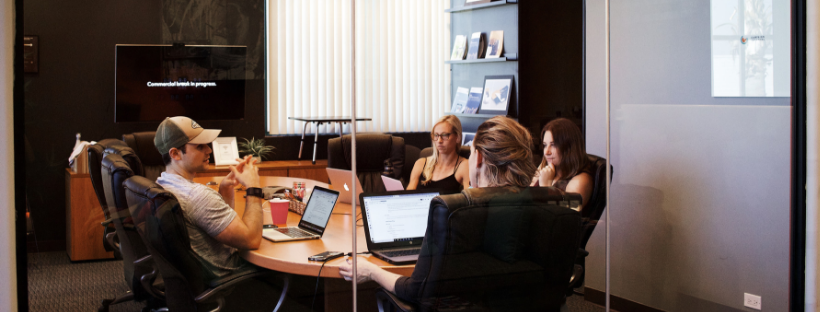Why you need to be thinking differently about your job
For the business savvy, the serial entrepreneurs; and everyone who works the 9 to 5 – it’s time to stop viewing work as trading time for money.
Long gone are the days where work is just a job and a facility to make money. Sure, money is still a focus in our culture however, it’s about conscious enterprise. The ability to make money on your own terms, how and when you want to. Of course let’s not discount the long road – and not an easy one at that – between start-up and profitability. However, times have changed and our attitude to work needs to keep up.
When I look back on my childhood, I recall…
My parents (who, to be clear, gave me a bloody great childhood) worked extremely hard and never complained — but they never said much about enjoying their work either. My father worked long hours so, we could live in a nice house and my mum, was dedicated to looking after us. She did everything that a mum was expected to do back then (and more!) – all with no complaint.
Everything they looked forward to was when they weren’t working. And I think that about sums up the approach of a generation – you work to earn money to live well.
Think about this: How often do you look at the clock? 9:13am…9:27am…9:31am.
And to think you have 38 -40 hours in a week, and will probably work for the next 40 years. Waiting for time to pass just so you can earn a buck, isn’t sustainable. This is where we need to shift our attitude.

Trading time for money is not sustainable
Here’s why.
- At the core of this attitude is the idea that you’d rather be doing something else with your time. You’re settling to work so you can earn.1
- Beyond an income, you aren’t getting anything else out of this arrangement.1
Instead, what if:
- You enjoyed what you do so much so that you weren’t settling for the sake of money
- You recognised that the perspective of selling your time for money is short-sighted
Now before you jump on me like a tonne of bricks, money is great and your compensation is an important part of your career. BUT if the work you’re doing is not helping you learn new skills, grow in your career, and ultimately become part of a fulfilling life, you probably don’t want to be there anyway.
Remember this, money is a by-product of living in alignment with your values, passions and talents. It doesn’t have to be a chore.
There was a time when entrepreneurship was mostly for the crazy or the brave — or maybe a bit of both. That’s still true, but now new groups of people are being brought into the world of entrepreneurship and it’s starting young. People aren’t so much choosing entrepreneurship as they are being faced with the opportunity to embrace it, even if they are building a career, rather than a business.

Take control of your income
“You should be moving towards building systems you control rather than relying on outside systems like the actions of others or a steady pay from an employer.”
When entrepreneurs hear “systems,” they often think of Michael Gerber’s famous E-Myth Revisited, but the principle is the same for those in jobs. If you start to see your pay as only one income stream of several that you have — or want to have — then you won’t allow an unbalanced reliance on that income stream to unduly influence the way you think, work and live.
Take the opportunity to periodically apply the 80/20 rule within your workflow. What 20 percent of your workflow is responsible for the 80 percent of results? What comprises 80 percent of your bottlenecks? Adjust accordingly and revisit often.

Commit to yourself first
“While ‘selfish’ is often seen as ‘conceited,’ taking care of yourself first is the surest pathway to allow you to take care of others while staying strong.”
This doesn’t seem to be a hard case to make anymore. When you find yourself saying, “I should do that more often,” in response to hearing about someone else’s activities, make a note of it and ask yourself why you aren’t? Is it because you really don’t have the time or you haven’t taken the time?
Play to win
“Sometimes the hard knocks of life lead us to focus solely on covering our overhead. But a strong offense is the best defence. Playing to win is a different mindset from avoiding loss.”
This tactic requires strong grounding because it is in the nature of humans to enjoy our comfort zones. Our “why” has to be clear and real enough to compel us to keep improving and striving, and a “play to win” strategy doesn’t meekly improve around the edges of our skills and work, but challenges us to go for those big wins that can propel us forward to possibilities we hadn’t previously imagined.

Be present
“Rapid change is all around us, and we must condition ourselves to stay present every day by reviewing choices about our living situation, diet, lifestyle and occupation in order to happen to life, instead of letting life happen to us.”
Many of us can, and often do, look back nostalgically, not at life in the 1800s or before, but even at the 1950s, when life seemed stable and fixed. Today, everything is changing around us all the time. The pace of change seems to be matched directly to Moore’s Law, and every 18 months we can look around at our technology and the way we live our lives and something significant has probably changed.
You don’t have to keep track of every single change that is coming up, but it is important to periodically evaluate whether the changes that are happening are positive or negative in relation to the way you are living your life, and adjust accordingly. Always having a method and pace to deal with change is vital.
Develop a success mindset.
“See yourself as successful rather than victimised. A successful person keeps moving forward and has the courage to embrace new and unfamiliar things with the certainty that they will succeed.”
Stoicism has undergone a renaissance in the last decade – It’s a helpful philosophy, encouraging you to choose your reactions to situations, rather than defaulting to what is expected.
But what makes successful people successful is their acceptance of these obstacles, knowing that not just overcoming those obstacles, but the way in which those obstacles are overcome, directly points to current and future success.
For sure you still have a boss, of course, but you’re not solely focused on taking home your pay and keeping your bosses happy. Rather, constantly make sure the work you do provides exceptional value to the company while also benefiting you and your resume.
Here’s an intriguing thought –
“An employee who is networking energetically, keeping their LinkedIn profile up to date, and thinking about other opportunities is not a liability. In fact, such entrepreneurial, outward-oriented, forward-looking people are probably just what your company needs more of.”
Mindset matters in life and business
1 https://medium.com/s/story/stop-viewing-work-as-trading-your-time-for-money-2297922a25da






Comments are closed.